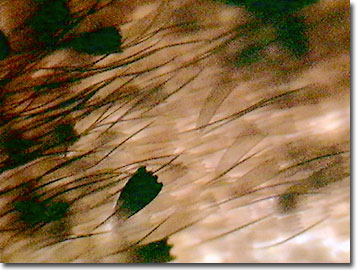Darkfield Digital Image Gallery
Dead Leaf Butterfly Wing
In the family Nymphalidae, the dead leaf butterflies (Kallima species) from Southeast Asia and East Africa get their common name from the uncanny resemblance of their wing undersides to dead plant leaves. So close is the mimicry, the wing pattern appears to feature "moldy spots of decay", a "midrib" for the "leaves," and the tail touches the twig and appears like a leaf stalk. Less distinct dark lines run obliquely from the center line towards the wings' margins, mimicking the veins of a leaf.

View a second image of a dead leaf butterfly wing.
The topside of this beautiful tropical butterfly does not resemble dead leaves. Rather in the Malaysian dead leaf butterfly (K. paraletka), the beautiful pattern of black, orange, deep blue, and pink wings bear no resemblance to the bland and innocuous butterfly revealed by the wing undersides. The bright colors probably play a role in sexual attraction and species recognition, important in the butterfly's reproduction.
Dead leaf butterflies are kept in butterfly pavilions around the world because of their beauty and clear illustrations of mimicry and camouflage. Caterpillars feed on various species of the shrubs and herbs in the family Acanthaceae including Acanthus of ancient Greek, Roman, and medieval descriptions and engravings, while adults feast on the sap and juices of flowers, leaves, dung, and rotting dead logs. In the wild, the dead leaf butterfly species thrive in regions of heavy rainfall and thick forests in hilly and mountainous terrain. Rarely are these species found in the open and they seem not to fly far distances. When this genus of tropical butterflies received its scientific name Kallima, the lepidopterist or taxonomist was certainly looking at the topside of the wings, since it is derived from the Greek word for beautiful.
Apparently there are two breeding seasons per year for the Kallima butterflies. One breeding season is from April to June and other initiates after the end of the rainy season. Friedrich Nietzsche, the controversial German writer and philosopher, used the example of the dead leaf butterfly as an illustration that there is no absolute good and evil since when in danger, the butterfly "lies" to a potential predator by sending the signals that "I am not a butterfly, I am a dead leaf, and can be of no use to thee". This is a "lie," which is good for the butterfly, but not its foe.
Contributing Authors
Cynthia D. Kelly, Thomas J. Fellers and Michael W. Davidson - National High Magnetic Field Laboratory, 1800 East Paul Dirac Dr., The Florida State University, Tallahassee, Florida, 32310.
BACK TO THE DARKFIELD IMAGE GALLERY
BACK TO THE DIGITAL IMAGE GALLERIES
Questions or comments? Send us an email.
© 1995-2025 by Michael W. Davidson and The Florida State University. All Rights Reserved. No images, graphics, software, scripts, or applets may be reproduced or used in any manner without permission from the copyright holders. Use of this website means you agree to all of the Legal Terms and Conditions set forth by the owners.
This website is maintained by our
Graphics & Web Programming Team
in collaboration with Optical Microscopy at the
National High Magnetic Field Laboratory.
Last Modification Friday, Nov 13, 2015 at 01:19 PM
Access Count Since September 17, 2002: 14830
Visit the website of our partner in introductory microscopy education:
|
|
